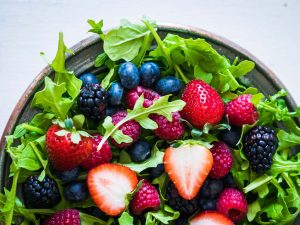Veganuary
A Dietitian’s Approved Guide To Success
January, a month of new beginnings, filled with hopes and dreams of a healthier, happier self. Sound familiar? Yes, we’ve all been there, done that. The repeated New Year’s resolution diet treadmill, oh so familiar, oh so pointless. “This year will be different”, you say. “This will be the year I succeed!”
If you have not yet succeeded, then perhaps it is time for a new approach. Time to give your diet and body the attention and love it truly deserves. Time to ditch those quick fix fad diets. Time to make simple, sustainable changes that result in a healthier you, while reducing your food-related carbon footprint by up to 50%.
Why not try out an exclusively plant-based diet for a month? And if it works for you, make it your life’s mission to maintain a plant-based diet. The benefits are enormous. From lowering cholesterol and blood pressure to reducing your risk of type 2 diabetes, hypertension, heart disease and obesity.
Both the British Dietetic Association (BDA) and the American Academy of Nutrition and Dietetics recognise that vegan diets are appropriate for all stages of the life cycle, including pregnancy, lactation, infancy, childhood, adolescence, older adulthood, and for athletes.
Why go vegan? Simply because it is good for you and the planet.
How do I go vegan? The key is in the planning. In order to achieve the health benefits while ensuring you are not missing out on essential nutrients your vegan diet needs to be well planned.
Here are my top tips on how to achieve a healthy, balanced vegan diet:
Fruit & vegetables:
- Are you eating at least 5-a-day?
- Does each meal contain a source ofvitamin C to boost iron absorption? E.g. pepper, broccoli, cabbage, Brussels sprouts, kiwi fruit, oranges, strawberries, pineapple, grapefruit or orange juice.
- Are you eating a rich source ofcarotenoids (vitamin A) daily? E.g. carrots, sweet potatoes, butternut squash, apricots, cantaloupe melon, spinach and kale.
- Are you eating greens rich invitamin K daily? E.g. Brussels sprouts, cabbage, kale, broccoli, spinach, spring greens, spring onions and kiwi fruit.
Starchy foods:
- Are you making plenty of high fibre choices, e.g. oats, old/new/sweet potato with skin, wholewheat pasta/noodles, brown rice, wholemeal bread?
Protein:
- Does each meal contain at least one of the following foods, e.g. beans, peas, lentils, chickpeas, tofu, tempeh, soya alternatives to milk and yoghurt, nuts, nut butters, tahini, seeds?
Calcium:
- Does your daily diet contain at least two portions of calcium-rich foods?
Here are examples of one portion:
- 200ml calcium-fortified soya, oat, nut, coconut or pea milk
- 200g calcium-fortified soya, oat or coconut yoghurt
- 100g calcium-set tofu
- 2 slices of soya and linseed bread fortified with extra calcium
Healthy fats:
- Do nuts and seeds feature in your daily diet?
- Are you eating foods high inomega-3 fats daily? E.g. chia seeds, ground linseed, hemp seeds, walnuts, and vegetable (rapeseed) oil as your main cooking oil.
Iron:
- Are you including these on a daily basis: lentils, chickpeas, beans, tofu, cashew nuts, chia seeds, ground linseed, hemp seeds, pumpkin seeds, kale, dried apricots and figs, raisins, quinoa and fortified breakfast cereal?
- Vitamin C boosts the absorption of iron.
- Avoid drinking tea or coffee with meals.
Zinc:
- Are you eating good sources of zinc throughout the day?
- Sources include beans, chickpeas, lentils, tofu, walnuts, cashew nuts, chia seeds, ground linseed, hemp seeds, pumpkin seeds, wholemeal bread and quinoa.
Vitamins B12 & D, iodine & selenium:
- I would recommend taking a daily supplement containing these nutrients.
- VEG1 supplement includes all these and more in one chewable tablet.
VNutrition app:
- Download this app to help you hit your nutritional targets.
Delicious recipes:
- Need inspiration? Try these recipes for a healthy, balanced vegan diet.
What should my vegan plate look like?
and
- Essential, concise and based on the most up-to-date scientific research.
Two must have books this January:
- “Vegan Savvy” by Azmina Govindji
and
- “Happy Vegan” recipe book by Fearne Cotton.
Feeling inspired?
- Sign up for “Go vegan for 30 days with the 30 Day Vegan Pledge” It may change your life!
Wishing you all a happy and healthy 2024!

